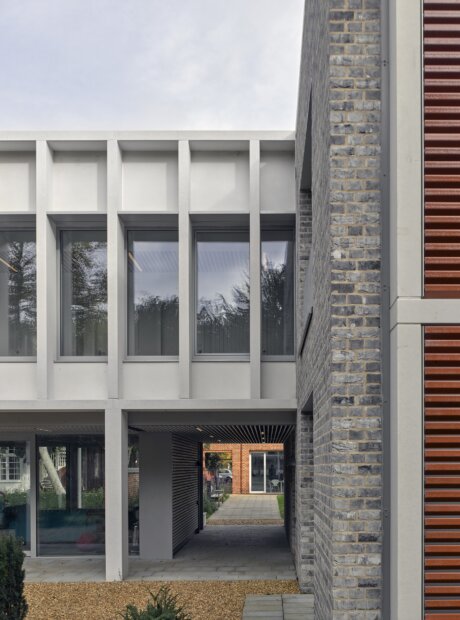Cranmer Road Student Accommodation, King's College Cambridge

Cranmer Road Student Accommodation is an ultra-low energy, all electric, Passivhaus development for King's College Cambridge. Fifty-nine graduate student bedrooms are provided across two new accommodation buildings each of differing modern character, but both designed to sit comfortably alongside the neighbouring arts and crafts villas. With its low embodied carbon structure and low operational carbon emissions, the Cranmer Road Student Accommodation is an exemplar student housing project that showcases many of the approaches to sustainable and low energy design that are essential for current and future projects aspiring to achieve net zero carbon.
Max Fordham, working alongside Allies and Morrison, provided M&E Engineering, Passivhaus Consultancy, and Acoustic services for the project.
As Passivhaus consultants we have supported the design team and contractor from early stage design through delivery on site. This included:
- Helping evaluate the benefits and implications of Passivhaus, so the client could decide whether to adopt the standard.
- Supporting the design team to develop a low-energy, buildable design, including facilitating workshops, carrying out modelling using the Passivhaus Planning Package (PHPP), and thermal bridging calculations.
- Working with the contractor through the site phase to help them realise the design, and inform specialist subcontractor design development.
- Liaising with the Passivhaus certifier throughout the project.
We also provided acoustic input relating to the sound insulation from the CLT construction and for planning, as well as noise surveys.
Both buildings are occupied, and we are using Post-Occupancy Evaluation to learn lessons, fine-tune the buildings, and improve future designs. This includes a BUS methodology occupant survey, and analysis of meter readings.
"The College has a history of high-quality architecture, and the Cranmer Road student accommodation lives up to these standards. Using timber as the primary structure helped to limit the scheme's embodied carbon, while operational energy is kept low through Passivhaus. Electricity is the sole fuel source, which works well with the ongoing decarbonisation of the UK electricity grid. We've enjoyed working on the project as MEP consultant, Passivhaus designer, and acoustic consultant from early design through site delivery and post occupancy evaluation."Gwilym Still, Passivhaus Leader at Max Fordham
The buildings use electricity as their sole energy source, which aligns with the ongoing decarbonisation of the electricity grid. Mechanical systems are decentralised, with point of use space heating and instantaneous domestic hot water generation, to limit distribution losses. Waste water heat recovery and low flow showers limit the energy required for hot water, and mechanical ventilation with heat recovery (MVHR) is used to limit heat loss and ensure good air quality year-round.
The summer comfort strategy has a combination of automatic bypass of the heat exchanger on the mechanical ventilation units, and openable windows. The design uses simple, standard components in systems that were easy to commission and should be simple to maintain.
The buildings' achieved airtightness results three to four times better than the Passsivhaus limit, more than 50 times better than building regulations allow. Measured peak heating demand has been 8 W/m², lower than the Passivhaus target of 10 W/m².
"King’s College is delighted with the Cranmer buildings, their quality design, construction, finish and energy effectiveness. From the start the students were involved in the planning for low carbon yet comfortable buildings, and it is believed this has been achieved. The buildings were constructed to an exacting high standard yet are relatively simple in layout, and ideal for study in quietand well insulated rooms. The ‘household’ design of clusters of rooms and associated kitchens proved to be ideal during the current pandemic, where the students had the additional benefit of space to work and live together while not being crowded."Philip Isaac, Domus Bursar at King's College Cambridge

The Villa building, designed with a brick façade to sit within the Arts and Crafts architecture of the surrounding area

The Villa building, designed with a brick façade to sit within the Arts and Crafts architecture of the surrounding area

View looking north, showing the ground floor common room which serves all the buildings on the site, and the link corridor on the first floor

View out from a kitchen in the Stephen Taylor building

A kitchen in the Stephen Taylor building. The exposed CLT design was developed to control noise, both within the room using the suspended acoustic panels, and to manage noise transfer to adjacent spaces.

The link corridor in the Stephen Taylor building, with low-energy LED lighting, which switches off automatically when not needed
Project Team
Architect Allies and Morrison
Environmental Engineer Max Fordham
Passivhaus Consultant Max Fordham
Sustainability Consultant Max Fordham
Acoustic Consultant Max Fordham
Structural Engineer Smith and Wallwork
Quantity Surveyor Faithful + Gould
Contractor RG Carter
Main Contact
- Gwilym Still
- MEng PhD CEng MIMechE CEPH
- Max Fordham LLP
- Passivhaus Leader
- g.still@maxfordham.com
- +44 (0)1223 240 155


